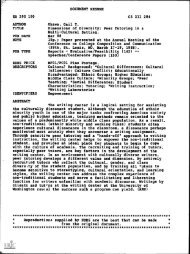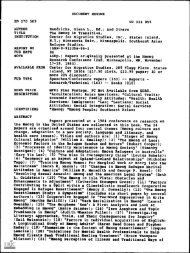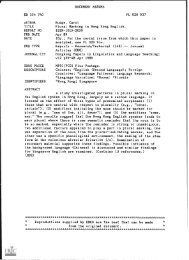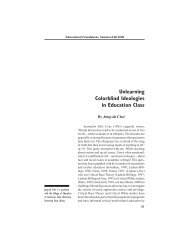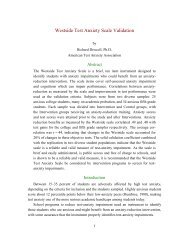Higher Education and Employment: An International Comparative ...
Higher Education and Employment: An International Comparative ...
Higher Education and Employment: An International Comparative ...
Create successful ePaper yourself
Turn your PDF publications into a flip-book with our unique Google optimized e-Paper software.
<strong>Higher</strong> <strong>Education</strong> <strong>and</strong> <strong>Employment</strong>Among the countries we studied, only very nominal fees are charged byinstitutions of higher education, except in the case of the Philippines. buteven here it is only private higher education institutions %.hich charge fees.However, the pursuit of higher education rarely depends entirely onscholarship incentives. In countries like Egypt scholarship incentive as agenerator of dem<strong>and</strong> for higher education has a score of only 1.4 on a threepointscale, where a score of 1 denotes 'unimportant' <strong>and</strong> a score of 3denotes 'very important'.8 In India, one out of ten students gave scholarshipincentive as the reason for their pursuit of higher education. In thePhilippines, a scholarship or grant 'was of no importance to most of therespondents of our sample'.9 In Tanzania, bursary incentive was responsiblefor the pursuit of higher euucation did not exceed 1 per cent of thestudent population. In Zambia only 1.27 per cent of the students cited'bursary incentive' as the reason for pursuit of higher education. Theseresults show that 'bursary incentive' as such plays a very insignificant rolein creating dem<strong>and</strong> for higher education. Even in the least favouredcountries the situation is not much different. In the Sudan, for example,about 10 per cent of the graduates gave financial assistance as the reasonfor pursuit of higher eduL .:ion.Scholarsl.ips in one form or another being easily available in developingcountries, one may ask how many of the students could have pursuedhigher education if there had been no grants? As the experience of somedeveloped market economies shows, the dem<strong>and</strong> for higher educationwould have definitely fallen. On the other h<strong>and</strong>, if bursaries are introducedto attract students to specific disciplines where manpower is needed, theresult may not he satisfactory, as was seen in Zambia in the case of teachereducation. It is the career <strong>and</strong> employment prospects irherent in thediscipline that are the prin-ipal motivating factor in the pursuit of highereducation, though scholarsh.r. <strong>and</strong> grants do influence the overal! dem<strong>and</strong>.'Study for its own sake'Complexities involved in the development of higher cJucation stem mainlyfrom the dualistic goals on which its guiding principles are based. Thedominant goals are economic, education being seen as a production systemto provide the manpower for various categories of job,. This involves, onthe one 'i<strong>and</strong>, matching the development of education to the qualificationscalled for by the national economy, <strong>and</strong> on the other, matching the career<strong>and</strong> employment expectations of individuals with the actual allocation ofsocial roles. Thus education appears, a priori, to be based on the economicstructure <strong>and</strong> potential of the country.<strong>An</strong>other set of goals of education is socio-cultural, where education isseen as a consumption system preparing human beings with a variety ofexperiences on which to base their values <strong>and</strong> outlook on life. The4049




